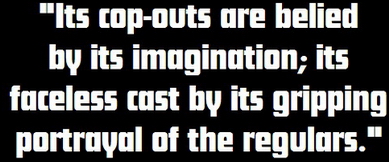|
| |
|
STORY PLACEMENT THIS STORY TAKES PLACE BETWEEN THE NOVELS "THE DOMINO EFFECT" AND "THE LAST RESORT."
WRITTEN BY NICK WALTERS
RECOMMENDED PURCHASE OFFICIAL BBC 'EIGHTH DOCTOR' PAPERBACK (ISBN 0-563-48603-1) RELEASED IN APRIL 2003.
BLURB The history of Earth has been splintered, each splinter vying to become the prime reality. But there can only be one true
history. plan to ensure that the correct version of history prevails - a plan that involves breaking every law of Time. But with the vortex on the brink of total collapse, what do mere laws
matter? riots to the ruins of the city in 2003, from a chance encounter between a frustrated poet and Isambard Kingdom Brunel, to a plan to save MANKIND, the stakes are raised ever higher - until IT IS reality itself THAT Is threatened. |
|
|
Reckless Engineering APRIL 2003
Despite my waxing eloquent about their merits for many years now, it wasn’t until earlier this year that my brother tried his first original Who novel: Reckless Engineering by Nick Walters. Some might think it a peculiar choice for an introductory read, given that it is neither a novel of great repute nor even one that’s designed to be read in isolation, but on reflection I feel it’s one that’s representative of their general quality; at least prior to the 2005 reboot. Indeed, Walters’ fourth BBC Books effort seems to sit comfortably in the mid-table grey, embodying all the adult sensibilities of the Wilderness Years spin-offs whilst telling a cracking (but far from faultless) terror-strewn tale.
With hindsight, the post-Time Zero arc was one of the most ambitious storylines that BBC Books ever attempted. I love the conceit that the history of our universe is constantly being re-written, and Reckless Engineering really milks this idea for all its worth. The Doctor, Fitz and Anji aren’t hopping from parallel to parallel exploring quantum realities entirely divorced from that we know; they’re fighting to restore “the right version of history” - “the right version of history” according to the Doctor. Accordingly Walters explores the morality of the Doctor’s mission, using his companions to look at whether he actually has the right to wipe out entire aberrant timelines, whilst at the same time painting a picture of a world so utterly horrifying that - ethical or not - it’s hard not to back the Time Lord.
about Reckless Engineering is that Walters manages to present the old post-apocalyptic chestnut in a new and innovative fashion. Whereas the previous novel, The Domino Effect, showed us a world where Alan Turing never invented his “Universal Machine”, here the author comes up with a way of subverting history that’s completely out of leftfield. In 1831, an alien machine ages the population of Earth by about forty years in as many seconds. Barely anybody over the age of thirty survives. Animals are wiped out completely. By 2003, or ‘Year 160’, Earth has become a nightmarish world of cannibal children and medieval law, and it is into this inimitable cauldron that our heroes arrive.
Reckless Engineering therefore works on two very different, yet inexorably linked, levels. Most overtly, we have good old-fashioned Who horror - ravenous “Wildren” and skull-faced industrialists; timey-wimey terrors of the most macabre kind. But then underneath we have the smouldering conflict between the Doctor and Fitz – two men bound by a friendship that’s survived Time Wars, paradoxes and century-long pit stops, but that is now challenged by a burning ethical issue. Does the Doctor have the right to restore the correct version of history, wiping this world and all its good and evil from creation? Fitz certainly doesn’t think so, and he’s prepared to sacrifice his life to make the point. Walters presents both men’s arguments in such a fashion as to truly divide the reader; to really have him question whether the Doctor is doing the right thing. And coming from Fitz, the mutiny really stings. As much as I rate her, I don’t think that had it been Anji championing this timeline, Reckless Engineering would’ve packed half the punch that it does as written.
However, there are elements of the book that fall flat for me. Having Fitz’s biodata corrupted by this timeline, for instance, feels like a bit of a swiz, and threatens to undo the good work that the author has done with the character. I also feel that most of the supporting characters are far too forgettable to have the desired effect; only the little girl in 1831 prompted any sort of emotional reaction from me. Worst of all though is the cop-out climax, the expediency of which is brought into sharp focus by the ingenuity demonstrated by the author up until that point.
Nevertheless, Reckless Engineering is a predominantly impressive
tale. Its cop-outs are belied by its imagination; its faceless cast by its
gripping portrayal of the regulars. The real question, I suppose, is what
my bro made of his first Doctor Who book since the 1970s; a question
that is probably best answered by the fact that he’s now clamouring for
more.
|
|
|
Copyright © E.G. Wolverson 2010
E.G. Wolverson has asserted his right under the Copyright, Designs and Patents Act, 1988 to be identified as the author of this work. |
|
|
Unless otherwise stated, all images on this site are copyrighted to the BBC and are used solely for promotional purposes. ‘Doctor Who’ is copyright © by the BBC. No copyright infringement is intended. |
|

.jpg)
.jpg)

 What I find particularly impressive
What I find particularly impressive